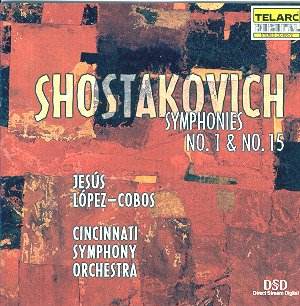 |
Dmitri SHOSTAKOVICH (1905-1975) Crotchet
AmazonUK AmazonUS |
Coupling Shostakovich's first and last symphonies is a good idea. The beginning and end of his symphonic writing brings complementary and diverse observations. Or it should … I'm not sure that Lopez-Cobos really penetrates into the music enough to distinguish either.
The First Symphony is a masterly symphonic debut (Shostakovich was 19), one precocious with talent, one signalling an individual voice, one already determining a personal musical world: cynicism, melancholy, something burdened, chilling and very intense. Shostakovich's use of motivic cells, counterpoint, solo lines and vivid orchestration is announced. Forty-five years later, the Fifteenth similarly puts reliance on chamber textures, on musical autobiography - a hallucinatory world of quotations (Rossini, Wagner and self) that tread a narrow line between reality and nightmare. The Fifteenth is, in my view, Shostakovich's greatest symphony, a paring-down of essentials to starkly reveal frame of mind and circumstance. The orchestration, although vivid and colourful, is sparse and telling, the lines overwhelmed by deep troubles, the composer's innermost confidences embedded in the music.
Well that's the theory. Lopez-Cobos has prepared immaculately the Cincinnati Symphony; and Telarc's recording is detailed and tangible. The problem is that Lopez-Cobos doesn't begin to suggest what lies at the heart and in the recesses of the music. I can't even complain that he conducts either work as a 'concerto for orchestra' (both have that element, especially No.15) for Lopez-Cobos leads assured, symphonically compliant readings that reject a display element, which might (perhaps) have compensated for an overall lack of bite and characterisation. I prefer him however to Solti's overbright Decca/Chicago account of No.15. There is though no sense, from Lopez-Cobos, of the composer's neurosis, the anxious glance over the shoulder, a heightened sense of atmosphere (real or imaginary).
Of course, both pieces retain their objective greatness as symphonic works of art; nevertheless, Lopez-Cobos's neutrality as an interpreter doesn't suggest the composer's commentary or codes. Lopez-Cobos has an admirable concern for the text, and his orchestra is virtuosic; yet the concern is temporal. I can't recall hearing a less fantastic (in a Don Quixote sense) opening movement to the 15th before, or a slow movement (despite a well taken 'cello solo) that fails to suggest shivering loneliness. The build-up to the finale's climax is tame, the single stroke on the side drum (here at 9'34"), which should be like a guillotine, severing mind from body, hardly features; the percussion at the close - kitchen utensils heard from a hospital bed perhaps - fail to signify 'the end'. In the first symphony, there is no edge to the 'chase' element of the scherzo; the solo piano doesn't accompany any silent-movie image here.
Addressing this review to anyone unfamiliar with either symphony, then this release would be ideal as an introduction; Lopez-Cobos's musicianship and the overall excellence of playing and sound will teach you the notes. I don't feel that an experienced Shostakovichian will be overly troubled, largely because the scope of these symphonies will already be familiar from existing recordings. In No.1, Kondrashin and Ormandy remain old favourites, and Kurt Sanderling is a truth-telling guide in both (Berlin Classics). As for similarly coupled CDs, the Japanese market has Inbal (Denon) and Fedoseyev (Canyon), neither officially available in the UK. I liked a lot of Inbal's cycle, certainly 1 and 15; Fedoseyev is a law unto himself, fascinatingly so. For No.15, Jansons (EMI) is preferable, and Maxim Shostakovich's pioneering Melodiya recording remains an invaluable LP (his unavailable LSO remake for Collins isn't bad either). Each of these conductors brings something more individual, more involved, a wilder-eyed commitment or something more orchestrally varied. Lopez-Cobos brings no reaction at all - what he does is fine, but it's not nearly enough.
Colin Anderson